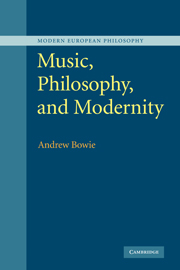Book contents
- Frontmatter
- Contents
- Preface
- Introduction
- 1 Form, feeling, metaphysics, and music
- 2 Music, language, and the origins of modernity
- 3 Rhythm and Romanticism
- 4 Hegel, philosophy and music
- 5 Music and the subjects of Romanticism
- 6 Music, freedom, and the critique of metaphysics
- 7 Pro and contra Wagner
- 8 Music, language, and being: Wittgenstein and Heidegger
- 9 Adorno: musical philosophy or philosophical music?
- Conclusion
- References
- Index
6 - Music, freedom, and the critique of metaphysics
Published online by Cambridge University Press: 15 October 2009
- Frontmatter
- Contents
- Preface
- Introduction
- 1 Form, feeling, metaphysics, and music
- 2 Music, language, and the origins of modernity
- 3 Rhythm and Romanticism
- 4 Hegel, philosophy and music
- 5 Music and the subjects of Romanticism
- 6 Music, freedom, and the critique of metaphysics
- 7 Pro and contra Wagner
- 8 Music, language, and being: Wittgenstein and Heidegger
- 9 Adorno: musical philosophy or philosophical music?
- Conclusion
- References
- Index
Summary
Music, philosophy, and politics
Evaluations of the nature and significance of music were anything but uncontroversial before the end of the eighteenth century: Plato's comments in the Republic, and the battles over music during the Reformation make that clear. However, reflection on the significance of music takes on a different quality during the course of the nineteenth century and beyond. Music becomes more overtly linked to philosophical, ideological, and political controversies that influence modern social and historical developments. This chapter will explore some of the conceptual issues which arise in this context, as a prelude to a re-examination in chapter 7 of the paradigmatic example of this intensification of concern about the nature of music, the ‘case’ of Wagner. My extended treatment of Wagner is justified by the fact that issues associated with him have remained a part of disagreements about art, philosophy, and politics ever since. These disagreements are also important for a reason relating to a central theme of the book. Wagner's ‘positions’ on the issues involved cannot be reduced to what he says about them, but must also be assessed in terms of what he does in his music. Dahlhaus suggests that it was not Wagner's theoretical writings on cultural and philosophical issues that were most influential, but rather ‘the effect of the music itself, from which consequences for cultural politics emerged. One can, exaggerating only a little, actually talk of the emergence of the “Kulturkritik” of the end of the century from the spirit of music – Wagnerian music’ (Dahlhaus 1974: 13).Wagner's theoretical writings are just one interpretation of the real content of his works, and by no means always the best one.
- Type
- Chapter
- Information
- Music, Philosophy, and Modernity , pp. 166 - 209Publisher: Cambridge University PressPrint publication year: 2007

